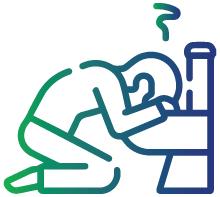
Allergy Drug panel
Allergy Drug panel
An allergy is a hypersensitive immune response to a substance that usually does not cause any reaction in most individuals. Pollen, food, insect bites, and drugs are examples of common allergens. The allergy drug panel serves as a diagnostic test to help identify specific drug allergies in patients.
The allergen is the substance responsible for triggering the reaction. In the event of an allergic reaction, the body produces an antibody called Immunoglobin E (IgE), and this test is used to measure the levels of IgE in the blood.
Thus, getting this test done is recommended for individuals who develop allergic reactions following the usage of certain medications. Early identification of drug allergies can play a crucial role in averting severe allergic reactions and improving the patient's quality of life.
Allergic reactions can be triggered by various drugs. However, there are certain medications that are more commonly associated with causing allergic reactions such as:
· Penicilloyl G
· Insulin Porcine
· Insulin human
· Insulin Bovine
· Gelatin Bovine
· Cefaclor
· Chymopapain
· Pholcodine
· Morphine
· Amoxicilloyl
· Suxamethonium (succinylcholine)
Chlorhexidine
Symptoms of allergy

Headaches

Itchy, watery eyes

Sneezing

Difficulty breathing

Swelling

Vomiting

Skin rash
Test preparation
To ensure the accuracy of the test, refrain from taking antihistamines, steroids, cortisone creams, and certain drugs such as Allegra and Cetirizine for a minimum of 48 hours prior to the allergy drug panel test
Interpretation of the Test Results
The test result may come as positive or negative.
Positive test result
Elevated allergen-specific IgE levels indicates that the person is allergic to that particular drug.
Negative test result
Decreased allergen-specific IgE levels indicates that the person is not allergic to that particular drug
FAQs
How is the sample collected for IgE antibody testing for allergy drug panel?
For blood sample collection, a small needle is inserted into a vein in your arm, and the required amount of blood is drawn. Usually, this procedure does not take more than 5 minutes
What is the turnaround time (TAT) for allergy drug panel test?
The test result is usually available within 6 working days after the sample collection. This duration may vary depending upon the diagnostic clinic
What are the risks associated with the test?
Since this test involves inserting a fine needle in your arm, there might be slight soreness or tenderness at the site of injection. On very rare occasions, the site might get infected
Who do drug allergies affect?
Drug allergies can affect anyone, although the likelihood of having or developing such allergies may increase if your biological parents have a history of drug allergies
How long does a drug allergy take to develop?
The occurrence of drug reactions can be either immediate, within an hour, or delayed, taking days or even weeks to emerge

